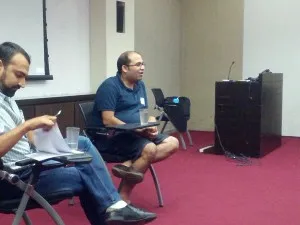Pivot! with Krishna Mehra, Co-Founder Capillary Technologies
This is a part of a new series which documents the pivots that a company had to make before ending up at what they do today
Krishna Mehra, Co-Founder, Capillary, was at a fire side chat as a part of What The Filter Kaapi (WTFK) trip to Bangalore. In a conversation with Ex- InMobi exec, Sridhar Ranganathan, he shared some interesting insights into his journey with Capillary so far.

While a mobile based loyalty solution for retail makes a lot of a sense, the number of itrations that they took to arrive at the concept was quite round about. After deciding to quit his plush job at Microsoft research, Krishna and his co-founder, Aneesh Reddy, the team went through quite a few pilot projects, which they scrapped, until they arrived at Intouch real time CRM and loyalty engine, which is Capillary's flagship product.
Deal search over text
The co-founders of Capillary Krishna and Aneesh were wing mates at their hostel at IIT Kharagpur. Krishna shared that starting up was always on their minds and the area which their startup would address was decided over dinner - "We were seeing a rapid growth in mobile and the retail sector in India and the aim was to capitalize on the intersection between the two."

In fact, the initial idea was to build a system that would help it's users find deals over a text message. Krishna said, "As always, the devil lies in the detail and we realized how difficult this problem was to execute. We didn't go ahead with building the product."
They did, however, go on to raise a seed round of Rs 15 Lakhs from the IIT Kharagpur e-cell.
Messaging concept for Durga Puja
The Capillary trio decided to take it one step at a time, and they came up with a SMS based information tool, built for crowded events. They decided to take it to Kolkata during the Durga Puja time where users can text in to find alternate routes to a destination and hence avoid traffic. Krishna said, "There was a guy in the Kolkata traffic police who knew every street in the city and he knew which streets have traffic at what time. God only knows what will happen when the guy retires, and his job was to mark alternate routes on the software's map interface. This mark will be translated into a text and sent to the person requesting it."
Krishna shared that this product was built in two days, as the Kolkata traffic police had given then only that much notice. The took the product to telcos like Airtel and Vodafone so that they could use it during the Durga Puja time. However user behavior was against them. Krishna shared, "The system was in place and we thought it offered great value to the users, but nobody was really texting in. Now that we think of it, keying in a long street name on a mobile phone can be quite time consuming; the users chose traffic instead! Also, telcos gave us some very interesting information - only 13% of Vodafone users would send more than one text a month."
The Bengali shop owner
Krishna continued to work in Kolkata, trying to figure out a product for their business. At this point, someone from the audience asked him why Kolkata. Krishna said, "Well for one, I am from Kolkata, but the bigger reason was that if you can make it work in Kolkata, you can make it work anywhere!"
This time around, Krishna pitched "Shopbook", which would be like Facebook over SMS for merchants where they can send out offers to their client base at the touch of a button. Krishna said, "Back then, bulk SMS rates were about 11 or 12 paisa per SMS. The shopkeeper told us, 'I have a student plan for my phone where it is 1 paisa per SMS.' Then we pitched to him the time and effort he would save and he said, 'there's this boy in my office who doesn't do anything in the afternoon and he can send the SMSs without my efforts'. Then we pitched the control they would have because of the system on time etc and he said, 'most of my customers are house wives and they have no problem about what time they get messages.'"
At this point, Krishna has almost given up on the customer, when he noticed something. He says, "He had these small cards which had barcodes on them, which he was using for customer loyalty. We figured out that this wasn't working for him. In fact until then, it was impossible for clients to know how many loyalty points they had, even for retailers like Shoppers Stop. So we pitched a mobile based loyalty platform which was instantly received well."
Of course, there were a lot of changes to the product itself, but that's how they zeroed in on their flagship product. The rest, as they say, is history.
Learnings
From this story, Krishna shared some key learnings for early stage startups
- At the start, your critic is your best friend. There will be a lot of people saying good things about you. They are important too, but the one who's pointing out the bad things in your product is very important.
- Do regular smoke tests for your product. Put something out in the market. What you think will work might not always work in the real world.
- Be aware of where you should spend time and where you shouldn't. We spent 6 months debugging our code because we followed wrong advice (this happened to be their college professor!)
- Be quick to take your product to market. Fail fast - it is better to fail early than to fail three years later.
Stay tuned for more from Pivot! series







